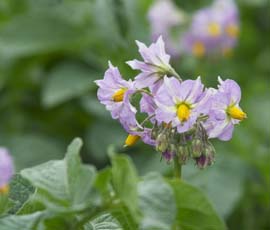Potato genome advance could help food security

Scientists have cracked the full genetic profile of the potato for the first time, creating the potential for faster selective breeding of new varieties.
The researchers said the discovery could “revolutionise” potato breeding by enabling breeders to create varieties which offered improved yield, quality, nutritional value and resistance to pests and diseases, as well as ensure food security in the future.
Iain Gordon, chief executive of the James Hutton Institute, said the discovery was the result of many years of hard work by the Dundee-based team working closely with Dundee University and Imperial College, London.
Prof Gordon said: “With global population forecast to reach nine billion by 2050, there will be many more mouths to feed and the genome sequence will allow scientists and breeders to increase the efficiency of potato production to help meet this challenge.”
After wheat and rice, potato is the third most important food crop. In 2009, more than 330m tonnes of potatoes were harvested worldwide. By 2020, it is estimated that two billion people will depend on potato for food, animal feed or income.
However, the potato remains vulnerable to diseases such as late blight which cause economic crop losses estimated at £3bn a year.
The new knowledge is expected to have a significant impact on the amount of time it takes to develop a new variety.
Characteristics are currently changed through conventional breeding programmes that can take between 10 and 12 years. But mapping the potato genome could offer growers access to varieties that were drought tolerant or resistant to diseases and pests, such as blight or potato cyst nematodes.
“Genome mapping will facilitate innovative ways of normal breeding of potatoes as it will be easier to identify genes and genetic markers responsible for important variety traits,” said Potato Council head of R&D, Mike Storey.
The findings will lead to greater understanding of potato biology and how the environment affects it, added Dr Storey.
“This could result in more efficient use of fertilisers, herbicides and pesticides, helping growers minimise cultivation costs while maximising sustainable yields.”

